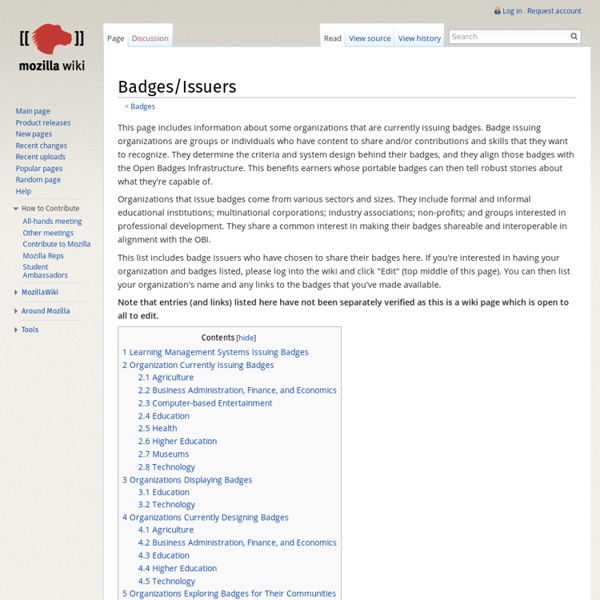Displayer API · mozilla/openbadges Wiki
Mozilla Open Badges Displayer API Please send questions and comments to the Google Group. Note about Security We send the assertion exactly as we received it, without any escaping or sanitization. You will want to do context-relevant escaping of any fields you plan on putting into your HTML. Converting email → user ID We avoid using email directly in the displayer API to discourage hardcoding email addresses. POST /displayer/convert/email Expects email field, returns JSON including the userId of the email account. userId is used in the majority of calls. Examples You can also in your browser to get the userId directly. REST Queries Queries are http requests that return application/json responses. GET /displayer/[userid]/groups.json A backpack user can expose groups of badges as public groups. GET /displayer/[userid]/group/[groupid].json A list of badges in a public group is exposed through the call, /displayer/[userid]/group/[groupid].json.
Mozilla and Badges: where next? | commonspace
Open Badges started as a modest experiment: build open source badge issuing software for ourselves and others. As momentum around this experiment has grown, it feels like the opportunity is bigger: we could build openness and user empowerment into how learning — and professional identity — work all across the web. With Open Badges 1.0 out there in the world, now is the right time to ask: where next for Mozilla and badges? When Mozilla and MacArthur Foundation first started work on Open Badges about 18 months ago, the plan was to build a badge interchange standard (like SMTP for skills) and a collection of open source software for issuing and sharing badges (Badge Backpack, Open Badger, etc.). We’ve built all these things. The thing is: there has been way more excitement and pick up of badges than we expected. Of course, the fact that educators and policy makers are interested in badges doesn’t represent a victory in itself. In some ways, there is a parallel to Gecko and Firefox.
Better Futures for 2 Million Americans Through Open Badges
President Clinton Announces Commitment to Create New Pathways to College and Career Success President Bill Clinton today announced a Clinton Global Initiative Commitment to Action to massively expand access to a new method of academic and technical skills assessment known as Open Badges – online representations of earned knowledge and skills – to improve the futures of two million students and U.S. workers. Speaking at the Clinton Global Initiative America (CGI America) meeting, an annual event of the Clinton Global Initiative that seeks innovative solutions for economic recovery, Clinton said three partners – the MacArthur Foundation, Mozilla, and HASTAC – have created the commitment to Open Badges. Outreach and technical assistance will be provided to help employers and universities across the country incorporate Open Badges in hiring, promotions, admissions, and credit over the next three years. “Open Badges is a great opportunity for our nation: American workers and businesses alike.
The Three T's of Badge System Design
We’ve been working on the Mozilla Webmaker badge system, or at least initial alpha badges for the Summer Campaign and it’s tough! We knew that going in - if it were too easy, then we probably wouldn’t end up with very valuable or robust badges - but that didn’t make it easier. There are many things to consider and it’s very easy to get caught up and stuck in the core question of what badges? That’s a really loaded question because its not just about what to call the badges - which is a rabbit hole of itself altogether - but its also considerations around specific skills, levels and granularity (which is a huge/tough one), assessment, experience, etc. I’ve since stepped back and looked at the process and realized that there were a few considerations that actually helped us move forward - and that those considerations were one or more steps removed from the badges themselves. 3 T’s of Badge System Design: (1) Types - general categories of badges. Our alpha badge TYPES*:
OpenBadges.me
Integrating the badge designer We've built our badge designer so that it can plug easily into other software applications. The designer can be launched seamlessly from your own tools, allowing for rich graphics to be created, and then a published graphic sent back to your code as a Base64 encoded PNG or JSON string. Read more about integrating with our API documentation. Let us know what you think We love the potential of the Mozilla Open Badges initiative and want to be a part of what's going on, that's the reason we built the badge designer in the first place. If you've got an idea, an image suggestion, an integration opportunity or anything else you'd like to contribute then you can let us know on our feedback page or by dropping an email to product-manager@myknowledgemap.com.



